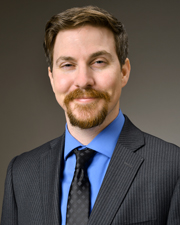
Scott D. Olson, PhD
- Associate Professor, Program in Regenerative Medicine
Biography
Dr. Olson is an Associate Professor at the University of Texas Health Science Center in the Department of Pediatric Surgery. Dr. Olson completed his doctorate in the lab of Dr. Darwin Prockop at Tulane University’s Center for Gene Therapy studying novel methods by which mesenchymal stem cells (MSC) can contribute to tissue repair. At University of California at Davis’s Health Sciences Institute for Regenerative Cures, Dr. Olson worked to apply MSC as a platform to develop new treatments for Huntington’s Disease. Dr. Olson joined UTHealth in September 2011.
Dr. Olson is an academic researcher with experience developing studies with translational applications. At UT Health, his primary focus is bringing his expertise in the field of adult stem cells, specifically MSC, to explore their potential in the treatment of Traumatic Brain Injury (TBI). MSC have been used in a number of completed, ongoing, and proposed clinical trials with reported therapeutic benefits. Dr. Olson strives to better describe the role of MSC in TBI injuries, highlighting their innate therapeutic abilities in an effort to create an improved treatment for TBI.
Education
- BS
- Biochemistry - Texas Christian University, Fort Worth, TX
- PhD
- Molecular and Cellular Biology - Tulane University, New Orleans, LA
- Postdoctoral
- Stem Cell Program - University of California at Davis Health System, Sacramento, CA
Areas of Interest
Research Interests
- Mesenchymal stem cells in cellular therapies to immunomodulate and restore homeostasis
Mesenchymal stem cells (MSCs) have been used in a large number of clinical trials to treat a wide variety of diseases and injuries with some success. When viewed as a whole, MSC have been most efficacious when used in a situation where there is a secondary or chronic injury associated with prolonged or exaggerated inflammation, perhaps due to their impressive ability to control the activation of the immune system systemically and in local microenvironments. We hypothesize that as we better understand the mechanisms by which MSC can exert their effects, we can begin to rethink and redesign cellular therapies to amplify their efficacy while increasing their safety. - Comparing MSC preparations
As part of our global effort to identify the best candidate for cellular therapies, we are working with a number of similar but different MSC and MSC-like cells derived from different tissues and even commercial sources. Our group has been designing and executing a number of assays designed to explore what biomarkers or in vitro assays we might be able to use to predict therapeutic efficiency in paired in vivo studies in collaboration with Drs. Triolo and Cox. These studies are initially focusing upon efficacy in models of Traumatic Brain Injury, but will expand later into other diseases and injuries with significant inflammatory elements. - MSC-effector cell interactions
Additionally, we are focusing upon MSC interactions with specific immune cell populations derived from both circulating peripheral blood mononuclear cells and leukocytes that reside in the spleen. We are particularly interested in the ability of MSC to influence monocyte and macrophage phenotype, and the resulting change in their secretome that may blunt inflammation or even restore system-wide homeostasis. - Mixed cell preparations as a therapeutic
A large part of the therapeutic value of MSC therapies relies upon the interactions that MSC have with the host immune system. To this end, we aim to augment the efficacy of MSC by introducing them directly to effector cells ex vivo and then shielding the resulting cells from immune recognition that may lead to rejection. In this manner, we hypothesize that we can create a systemic-style response inside an implantable construct that can be placed in the vulnerable microenvironment using a selectively permeable, non-toxic scaffold.
Publications
Joyce N, Annett G, Wirthlin L, Olson S, Bauer G, Nolta J. Mesenchymal stem
cells for the treatment of neurodegenerative disease. Regenerative Medicine
2010 5(6).
Meyerrose T, Olson S, Pontow S, Kalomoiris S, Jung Y, Annett G, Bauer G,
Nolta JA. Mesenchymal stem cells for the sustained in vivo delivery of bioactive
factors. Adv Drug Deliv Rev. 2010 Sep 30;62(12):1167-74. Epub 2010 Oct 13.
Gruenloh W, Kambal A, Sondergaard C, McGee J, Fierro F, Olson SD, Nolta JA.
Characterization and in vivo testing of mesenchymal stem cells derived from
human embryonic stem cells. Tissue Eng Part A. 2011 Mar 4.
Olson SD, Kambal A, Mitchell G, Pollock, K, Mitchell G, Stewart H, Kalomoiris,
S, Cary W, Nacey C, Pepper K, Nolta JA. Intercellular Examination of
mesenchymal stem cell-mediated RNAi transfer to Huntington’s disease affected
neuronal cells for reduction of huntingtin. Molecular and Cellular Neuroscience.
MS in review, 8/2011.
Olson SD, Pollock K, Kambal A, Cary W, Mitchell G, Tempkin J, Stewart H,
McGee J, Bauer G, Tempkin T, Wheelock V, Annett G, Dunbar G, Nolta JA..
Genetically Engineered Mesenchymal Stem Cells as a Proposed Therapeutic for
Huntington’s disease. Molecular Neurobiology. MS in resubmission 9/2011.
Olson SD*, McNerny G*, Pollock K, Huser T, Nolta JA. siRNA and RISC proteins
directly visualized using super-high resolution microscopy. MS in preparation, Oct 2011. *equal contributors